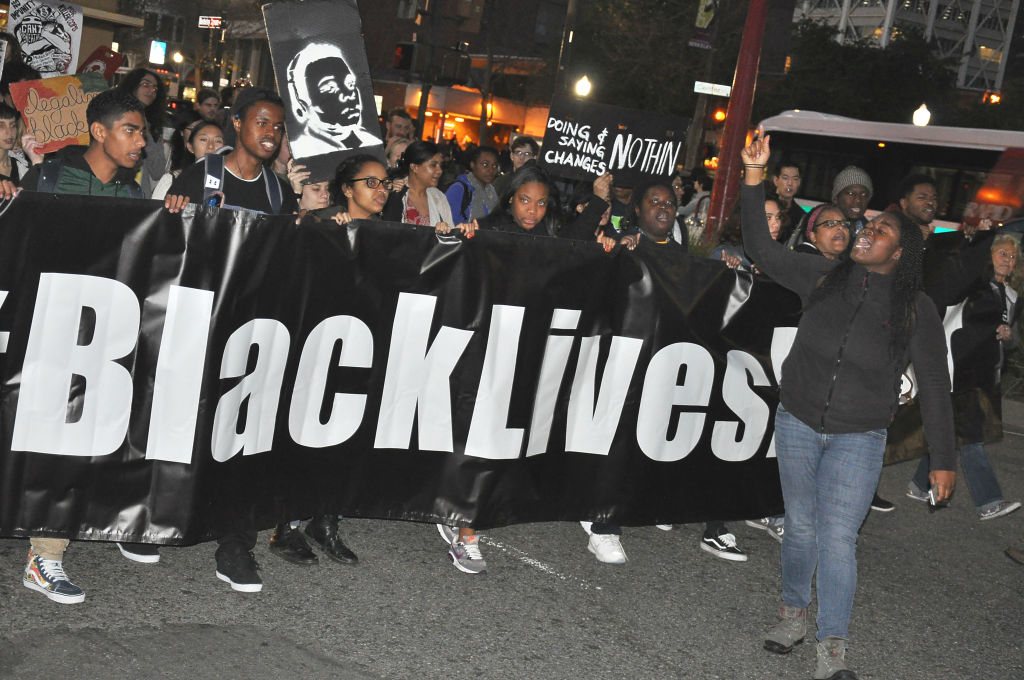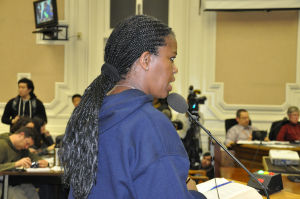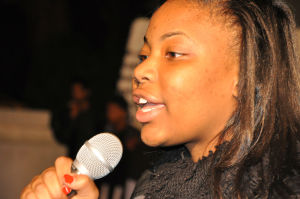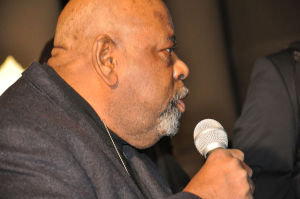Berkeley City Council Approves Investigation of December Protests, Bans Tear Gas, Baton Strikes
Feb 14, 2015
Posted in Berkeley, Ferguson/Black Lives Matter, Police-Public Safety

By Judith Scherr
Two months after Berkeley police injured peaceful protesters with batons, tear gas and projectiles, some 150 activists led by Berkeley High, Berkeley City College and UC Berkeley Black student unions, took the Black Lives Matter message to the streets Tuesday, marching from the Cal Campus to the city council meeting at Old City Hall.

The council got the message.
In a series of unanimous votes, the council approved a temporary ban on police use of tear gas, projectiles and over-the-shoulder baton swings for crowd control; asked the Police Review Commission to review both specific tactics used by police at the December protests and general crowd control orders; directed the city manager to write policy for police cameras; and affirmed Berkeley support for national Ferguson Action demands.
“This is what democracy looks like – when the people of Berkeley come out on the streets and demand their elected representatives take action,” said Councilmember Jesse Arreguin, speaking at a rally at Old City Hall before the meeting. Arreguin authored most the policies the council approved later.
Also addressing the rally, Berkeley High senior Kadijah Means talked about “what militarization looks like in our community.”
“ It’s not just about tear gas or AK 47s,” she said. “It’s about militarization as a mind set. It’s about cops believing we’re not all part of the same community. Because if they thought they were part of the community, we wouldn’t have the unjust deaths that we do.”
Inside the council chambers, several dozen speakers lined up to urge council approval of measures to hold police accountable for their actions at the December demonstrations protesting police immunity in the deaths of Michael Brown in Ferguson and Eric Garner in New York.
“’I found myself, a Black woman, targeted by officers,’” said Associated Students of the University of California Senator Madison Gordon, reading a letter from an unnamed friend.

“’I found myself bearing the brunt of a beating of a baton across my chest and torso…I was gassed and fell to the ground coughing….The system that promised to protect me, had failed me so horribly and for what? A peaceful demonstration to display my discontent for this system that continues to display violence and criminal acts on my people every day.’”
Andrea Pritchett from Copwatch said she had requested police operational plans for the demonstrations, but much of the response was blacked out.
“The police department is saying they redacted certain parts of the plan for security procedures,” Pritchett said. “They contain ‘intelligence information.’ My friends, that’s what a militarized police department does.”

Chamber of Commerce CEO Poly Armstrong, one of three speakers urging opposition to the measures, asked the council not to take crowd control tools away from police were they faced with another “civic uproar.”
“As the voice for business in Berkeley, Berkeley businesses would feel extremely uncertain if there were no way for police to protect the people of Berkeley and their businesses downtown,” she said.
The police chief was absent, though he generally attends council meetings when police matters are discussed. City Manager Christine Daniel told the Post he wasn’t asked to attend because he wasn’t required to give a report.
A police spokesperson told this reporter in December that aggressive police tactics responded appropriately to protesters, some of whom had thrown objects such as bottles at police. However, one public speaker called this “collective punishment.”
A unanimous council approved asking the city manager to write a plan within three months for implementation of police body and vehicle cameras, although some public speakers had expressed skepticism. In a recent Emeryville police shooting, the officer’s body camera was off and in the case of Eric Garner, the police officer who choked him was not indicted even though the choking was caught on camera.
The council unanimously affirmed the Ferguson demands that include strict limits on transfer of military equipment to local law enforcement and repurposing funds for alternatives to incarceration.
The council unanimously approved the Police Review Commission conducting an independent review of the December protests and a general review of related crowd control policies, with councilmembers underscoring the PRC needs to use its power to subpoena documents and testimony.
And the council approved the interim ban – to be re-evaluated after the independent review — on police use of tear gas, projectiles and certain baton strikes when dealing with mostly peaceful protesters.
Addressing the young people at the meeting, Councilmember Max Anderson said, “You’re part of a struggle along a continuum. You’re part of an effort to ensure the basic principles of this country are upheld.
“We’ve arrived at a point where an inordinate amount of power resides with the police department and their representatives; we arrived at this because we believed they would always have our best interests to protect and serve the general public. That hasn’t borne itself out. And you’re response is appropriate, courageous and has to be ongoing.”